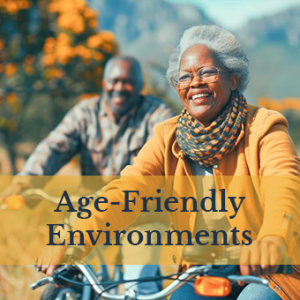
Enhancing Environments for Older Adult Social Connectedness
Presenter:
Hannah Grove, Global Centre on Healthcare & Urbanisation, United Kingdom
Abstract
Many older adults experience challenges related to social isolation and disconnection, while ageing in their homes, neighbourhoods and communities. Internationally, the World Health Organization has estimated that 1 in 4 older people experience social isolation, and both social isolation and loneliness remain key public health priorities. It is well recognised that the local environments in which we age, can play an important role in determining our health and wellbeing, and influence the opportunities we have to socially connect with others. A key challenge for policymakers, planners and service providers concerns how we can design age friendly environments and plan for older people’s diverse social and mobility needs, whilst also recognising inequalities in resources and environmental contexts that make social participation in community life much easier for some than others. Planners have the potential to play a vital role in addressing these societal challenges, through place-based approaches which enhance the qualities of our local environments to support ageing well in place, drawing on age friendly and healthy urban design principles.
To address social isolation and meet the diverse needs of an ageing and unequal society, we need to enhance the ageing and planning policy evidence base, to better understand the lived realities of older people in varied contexts, as well as what matters most to them. To explore ageing well in place from the perspectives of older people, requires a combination of spatial, subjective, and qualitative methodologies. Within planning policy, traditional forms of mapping can fail to capture more intangible details and qualities of place-making, which are of great importance for health and wellbeing. Disciplines such as health geography are increasingly drawing on more novel approaches, including the combination of qualitative and geo-spatial methods to capture more ‘in-situ’ lived experiences. It is important to capture these details, to ensure that they are valued, prioritised and incorporated within the ageing and planning policy landscapes.
Collaborating with Re-Engage, a charity whose mission is to reduce the social isolation of older people, this paper presents findings from a UK-based research project funded by the Royal Town Planning Institute (RTPI) titled ‘Enhancing Environments for Older Adult Social Connectedness (ENOLA-SC)’. This project has combined creative, qualitative and geo-spatial methods, including the use of ‘go-along interviews’ and ‘geo-narratives’ to identify the existing and ideal social worlds of older people, as well as consider the role of their local environment in providing either opportunities or challenges for social interaction and overall connectedness. This community engaged research offers insight into the lived realities of older people who have experienced social isolation and can help to enhance the evidence base of age friendly environment policy by recommending those person-in-environment supports and built environment interventions that would have most impact to older people themselves.
Bio(s):
Hannah Grove
Hannah is a Postdoctoral Research Fellow at the Global Centre on Healthcare & Urbanisation at Kellogg College, University of Oxford, and a Research Associate at the Oxford Institute of Population Ageing.
Hannah is an urban health geographer and planner, with an interest in how social and physical environments influence health and wellbeing throughout the lifecourse. With experience that bridges academia, policy, and practice, she is interested in how we can co-design environments and communities that promote a good quality of life, whilst recognising and addressing existing socio-spatial injustices and health inequities. Hannah’s research interests span urban health and social geography, healthy urban planning, and geographies of ageing. She is passionate about innovative methods and methodologies including the use of qualitative, geo-spatial and community-based participatory approaches to understand lived experiences of place.
Hannah has previously worked as a Postdoctoral Researcher and Assistant Professor in Human Geography at Dublin City University, a Research Assistant at Queens University Belfast, and as a Planning Policy Officer. She completed her PhD in the Department of Geography at Maynooth University, which explored how older people in the Greater Dublin Area define and enact ageing well in place.
